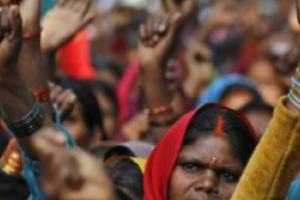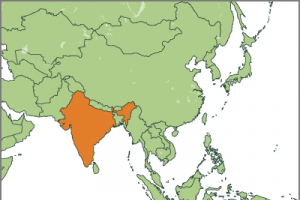On 3 February 2013, at around 4 am, twelve police platoons entered Govindpur and Nuagaon villages in Jagatsinghpur district of Orissa (present Odisha) and started beating up sleeping women & children, injuring many of them seriously, and arresting people at random. They are demolishing the betel vines in the area - the traditional and one of the most viable local livelihoods.
India
Other information
30 January 2013
Following a collaborative study conducted in the four Protected Areas: Nagarhole, Bandipur, Mudumalai and Wayanad, several social groups came together in Gudalur on December 21- 22, 2012. After discussing the state of the Protected Areas of the Nigiris Biosphere Reserve, repeated violation of the Forest Rights Act, 2006 and the Wildlife Protection Act - Amendment of 2006, the continued dispossession of the communities from their traditional habitat and community resources, The Gudalur Declaration was adopted declaring all the Tiger Reserves in the Nilgiris Biosphere Reserves as illegal.
Other information
30 January 2012
In the southern Indian state of Tamil Nadu, the French Michelin company is planning to build a huge tire plant that would impact on the community forest, rice fields and lakes of the Dalit people (the so-called "untouchables"). Some 1500 families depend on the forest, especially during the dry season. Other 13 neighboring communities also depend on the forest and the water.
Repression and even imprisonment since February 2011 have been the response to hunger strikes and demonstrations against the construction of the plant.
Bulletin articles
30 December 2011
Since December is the month in which International Human Rights Day is commemorated, we feel it is urgent to highlight the cases of two communities in countries that seem very distant from one another and yet have a great deal in common. In Honduras and India, these communities have been struggling for years against the new form of colonialism represented by powerful economic groups connected with oil palm plantations and the iron and steel industry, respectively.
Bulletin articles
30 November 2011
The new abstractions created by the climate change discourse in the form of REDD and REDD+ have come to deepen the commodification of forests as greater mobility is created and trading across countries and continents is made possible through climate mitigation and forestry schemes, say Kanchi Kohli and Manju Menon from the Indian organization Kalpavriksh, in the recent publication “Banking on Forests: Assets for a Climate Cure?”
Other information
30 September 2011
Hundreds of trees of native species used by local communities – such as neem, lemon, sehjan, amla, jamun, mango, chironji and mahua – were symbolically planted in the District Court headquarters in Robertsganj, capital of the district of Sonbhadra in the northern Indian state of Uttar Pradesh, on July 4, 2011 by tribal women to protest the tree plantation drive being undertaken by the Forest Department, with funding from the Japan International Cooperation Agency (JICA).
Other information
30 July 2011
The tribal villages of Surma and Golbojhi celebrated their liberation on the occasion of International Labour Day on May 1. The freedom came after 107 years of struggle when the tribals got ownership of the forestland they have been dependent on for centuries. Home to about 450 Tharu tribe families, the two forest villages are situated in the core zone of the Dudhwa National Park in Lakhimpur district of Uttar Pradesh (UP).
Bulletin articles
29 June 2011
One of the natural resource extraction activities that generates the most negative impacts, while also generating the most profits, is mining. Perhaps this is why the big global mining companies are now competing not only over mineral reserves but also to portray themselves most convincingly to the public as prime examples of “sustainability”.
Bulletin articles
5 June 2011
In a state such as Orissa in which Dalit and tribal groups comprise nearly 40% of the total population, the issue of ‘access’ to land and resources (forests, water, etc.) has been central to all conflicts. For traditional communities, ‘access’ is directly linked to civilizational paradigms and cultural ethos, which rather decide their ‘economics’, and not the other way round that may be true for modern, techno-centric civilizations. So, in traditional milieus, denial of ‘access’ to resources directly impacts ‘food security’.
Bulletin articles
30 April 2011
India continues to be one of the ‘hottest’ locations for carbon ‘offset’ projects despite the global carbon market slump: as of now, about 1700 projects claim to have achieved emission-reduction, and hence eligibility to sell carbon credits. Large Indian corporations control most of these projects irrespective of sector and geographical location, and instead of cleaning up the atmosphere the projects almost uniformly pollute people’s lives and the environment.



